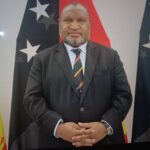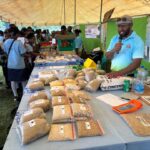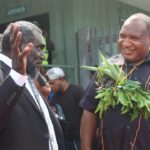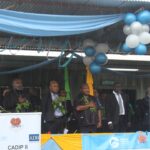Prime Minister Hon. James Marape has welcomed the opening of the Fabian Chow Training Centre in Kainantu, Eastern Highlands, hailing it as a transformative achievement for Papua New Guinea’s agricultural sector and a reflection of the Marape-Rosso Government’s commitment to rural development and economic growth.
The K17 million facility, funded through the Australian Government’s Incentive Fund, was inaugurated on Friday, December 13, 2024, by Agriculture Minister Hon. John Boito. The state-of-the-art centre is managed by the Fresh Produce Development Agency (FPDA) and is designed to equip farmers with the skills and tools necessary to drive agricultural innovation and growth. It is named after long-serving FPDA Chairman Fabian Chow.
Prime Minister Marape praised the collaboration between Papua New Guinea and Australia, highlighting the importance of partnerships in achieving the goals of the National Agriculture Sector Plan (NASP) 2024-2033.
“This is a proud moment for our nation and a testament to the strong partnership between Papua New Guinea and Australia,” Prime Minister Marape said.
“The Fabian Chow Training Centre represents a significant step forward in realisng the goals of the NASP 2024-2033. It will empower our farmers, support rural development, and contribute to our vision of achieving K30 billion from agriculture by 2030.”
The Fabian Chow Training Centre is a cornerstone of the NASP 2024-2033, a strategic plan launched under the Marape-Rosso Government to modernise agriculture, increase productivity, and improve livelihoods. The plan emphasises farmer training, import replacement, and sustainable growth, with the goal of making agriculture a driving force of the nation’s economy.
The new centre features a cutting-edge tissue culture laboratory and modern training facilities to improve the quality and yield of crops like potatoes. It is expected to meet the growing demand for certified planting materials both locally and internationally , providing new opportunities for farmers and communities.
Prime Minister Marape also emphasised that the opening of this facility aligns with the 2025 Budget, which places a strong emphasis on agriculture as a driver of economic diversification and rural empowerment.
” The budget includes significant investments in infrastructure, farmer training, and agricultural innovation to enhance the sector’s contributions to national GDP.”
In welcoming the opening, Prime Minister Marape called on the people of Kainantu and the Eastern Highlands to embrace the opportunities provided by the Fabian Chow Training Centre. He urged farmers to utilise the resources and training available to improve their productivity and livelihoods.
“This facility is a gift to our farmers and a beacon of hope for our agricultural sector. I urge the people of Kainantu and the surrounding districts to take full ownership of this centre, respect and protect it, and use it to transform their lives and their communities,” Prime Minister Marape said.
He also commended the FPDA for its strategic leadership in establishing the facility in Kainantu, which will now serve as a hub for agricultural innovation in the region.
“This is a shining example of what we can achieve through collaboration and determination. The Fabian Chow Training Centre is not just a building; it’s a symbol of the future we envision for Papua New Guinea—a future of opportunity , innovation, and shared prosperity,” he said.
Prime Minister Marape reaffirmed the government’s commitment to supporting the agricultural sector, emphasising that it remains a pillar of economic growth, food security, and rural development.
“Your government is committed to tilling the soil to harvest a brighter future for all Papua New Guineans. The Fabian Chow Training Centre is a step forward in this journey, and I congratulate everyone involved in making this vision a reality,” he said.
“The Fabian Chow Training Centre represents a new chapter in Papua New Guinea’s agricultural transformation and a lasting legacy of your government’s dedication to empowering farmers and building a stronger, self-reliant nation.”







